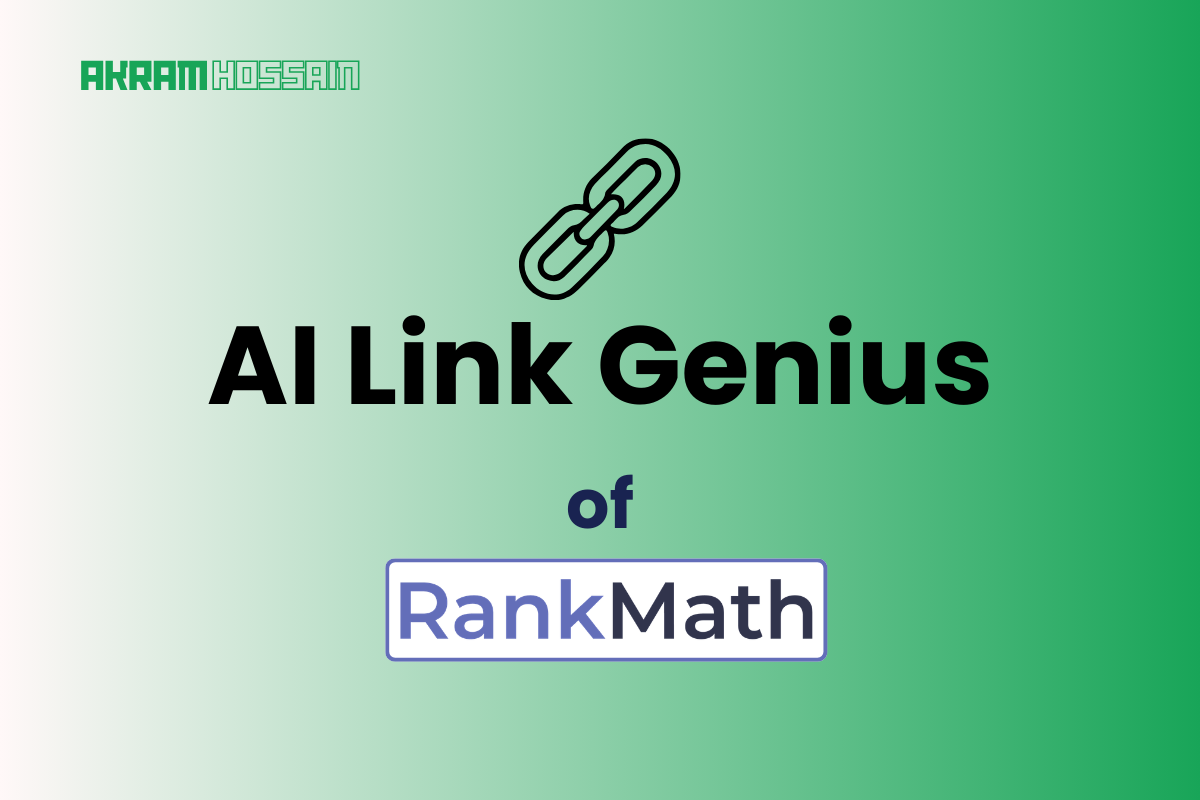“When I launched ThePromotes in April 2021, I had no traffic, no audience, and no clue how fast it would grow. Fast forward 18 months — $14.5K in affiliate income later — and one tool has been with me the whole way: Rank Math.”
Don’t want to read much? See The Result of ThePromotes:
My idea was simple: create a space dedicated to sharing the best AppSumo and lifetime deal products with people who love SaaS as much as I do.
I wasn’t starting with a huge budget, a big team, or even much experience in blogging, just a passion for deals and the drive to make it work.
But here’s the thing: in a competitive niche like affiliate marketing, passion alone doesn’t get you traffic.
That’s where Rank Math came in. Honestly, it became way more than “just another SEO plugin”.
It was like having a personal SEO coach guiding me at every step, from optimizing my very first blog post to scaling ThePromotes into a site that generated over $14.5K in 1.5 years.
If you know Bangla, and watch my full podcast about ThePromotes and the strategy I applied for it.
The Backstory – Launching @ThePromotes.com
I wanted to share the best AppSumo and lifetime deal products in one place. I’ve always been a big fan of LTDs (lifetime deals) and how they can save entrepreneurs and marketers a ton of money while giving them access to powerful tools.
But when I looked around, I realized that most deal blogs either felt cluttered or didn’t give the kind of detailed reviews and SEO-focused insights that I wanted to see as a user.
So, I decided to create ThePromotes as my very first blogging project. No fancy setup, no big budget, just a WordPress site (I know how to create a simple website using a WordPress theme), a passion for SaaS deals, and a belief that SEO could make it work.
The early days were rough. Like most new bloggers, I struggled with the usual questions:
- What should I write about first?
- How do I get traffic in such a competitive space?
- How do I make sure my content actually ranks on Google?
That’s when I realized if I wanted ThePromotes to stand out, I needed to take SEO seriously right from day one.
And this is exactly where Rank Math became a game-changer for me. It wasn’t just a plugin I installed and forgot about; it guided me through every step of optimizing my site, from setting up the basics to fine-tuning every blog post.
Why I Chose Rank Math for @ThePromotes from Day One?
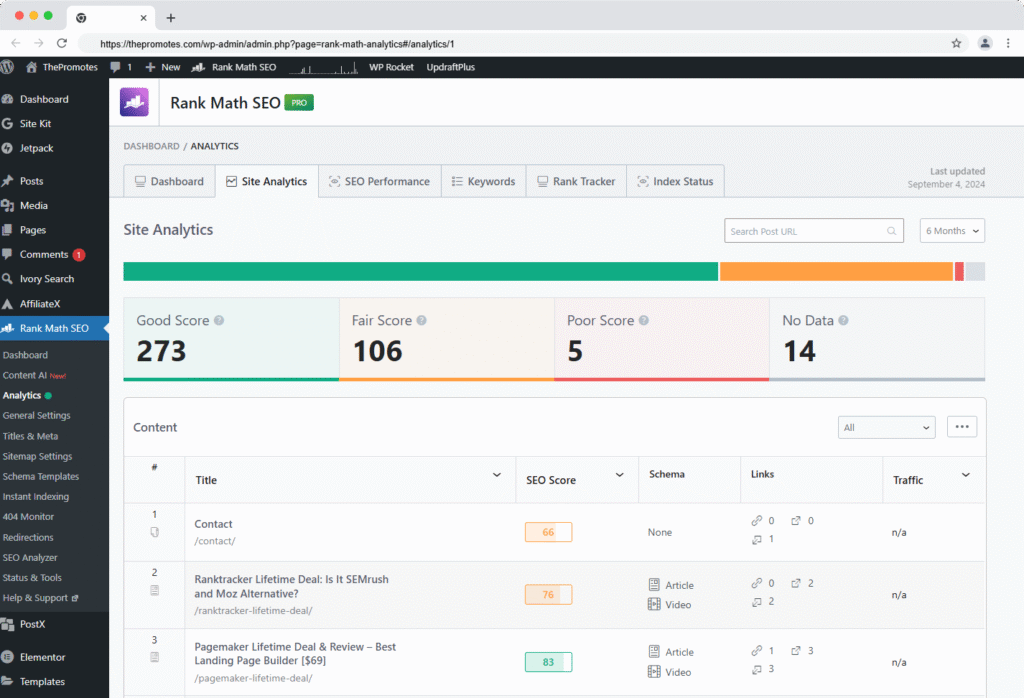
Simply, I wanted this blog to grow, so SEO had to be at the core. That meant picking the right SEO plugin from day one.
I didn’t want to spend weeks figuring out complex settings or switching tools later when the site started gaining traction.
Here’s why Rank Math was the obvious choice for me:
Ease of Use for a Beginner Blogger
Back in 2021, I wasn’t an SEO pro yet; I was just starting my blogging journey.
Rank Math’s setup wizard made the entire process painless. It connected with Google Search Console, helped me configure site basics, and gave me a solid SEO foundation without overwhelming me.
You can read my other blog to configure Rank Math easily.
Powerful Enough to Scale
At the same time, I didn’t want to outgrow my SEO plugin after a few months. Rank Math had advanced features like schema markup, redirections, and analytics baked in. It felt like a plugin I could grow with, not just a quick fix.
On-Page Optimization Guidance
One of the most practical features for me was the content score system. As I wrote product reviews and AppSumo deal articles, Rank Math gave me clear guidance on keywords, internal linking, and readability.
It was like having a checklist that made sure I wasn’t missing the basics that could make or break rankings.
Rich Snippets for Deals and Products
Since ThePromotes is all about SaaS and lifetime deal products, showing up in Google with rich snippets (star ratings, product details, pricing, etc.) was a big win.
Rank Math’s built-in product schema support made this super easy, no need for extra plugins.
The Rank Math Setup – Building a Strong SEO Foundation
Once I decided to go with Rank Math, the first step was getting the foundation right. The setup process was surprisingly smooth, and within a couple of hours, ThePromotes was ready to hit the ground running with SEO.
Here’s how I approached it:
- Installing Rank Math & Using the Setup Wizard
The setup wizard was a lifesaver. It walked me through the essential settings step by step, no guesswork, no confusion.
Read my full Rank Math Setup blog.
From connecting accounts to choosing the right SEO defaults, it made sure I had a solid foundation before I even published my first article.
- Connecting Google Search Console & Analytics
I connected ThePromotes directly with Search Console and Analytics through Rank Math. Having all the important data in one place meant I could track performance without juggling multiple dashboards.
This later helped me see exactly which AppSumo deal reviews were driving the most clicks and impressions.
- Choosing the Right Schema for Affiliate Reviews
Since ThePromotes is centered around SaaS and lifetime deals, I selected the Product schema for my reviews.
This allowed my articles to show up in search results with rich snippets like star ratings, product names, and other details, something that instantly made the content more clickable and trustworthy.
- SEO-Friendly Permalinks & Meta Templates
Rank Math also made it easy to set up SEO-friendly permalinks and default meta templates.
Instead of wasting time manually writing every title and meta description, I created a structure that automatically included the product name and focus keyword. This kept things consistent while saving me a ton of time.
- Optimizing Categories & Tag Archives
One often-overlooked area for new bloggers is categories and tags. With Rank Math, I optimized these pages so they weren’t just empty archives but actually targeted deal-related keywords.
This added another layer of discoverability and helped build topical authority around AppSumo and LTDs.
By the time I was done, ThePromotes had an SEO-friendly structure in place that wasn’t just “technically correct”, it was actually tailored to the type of content I was publishing.
That foundation ended up playing a huge role in scaling the site quickly.
On-Page Optimization – Rank Math in Action
Once the foundation was set, the real game began: creating content that not only ranked but also converted.
This is where Rank Math really started to feel like more than just a plugin; it was like having a built-in SEO assistant guiding me while I worked.
Content Score System for Smarter Posts
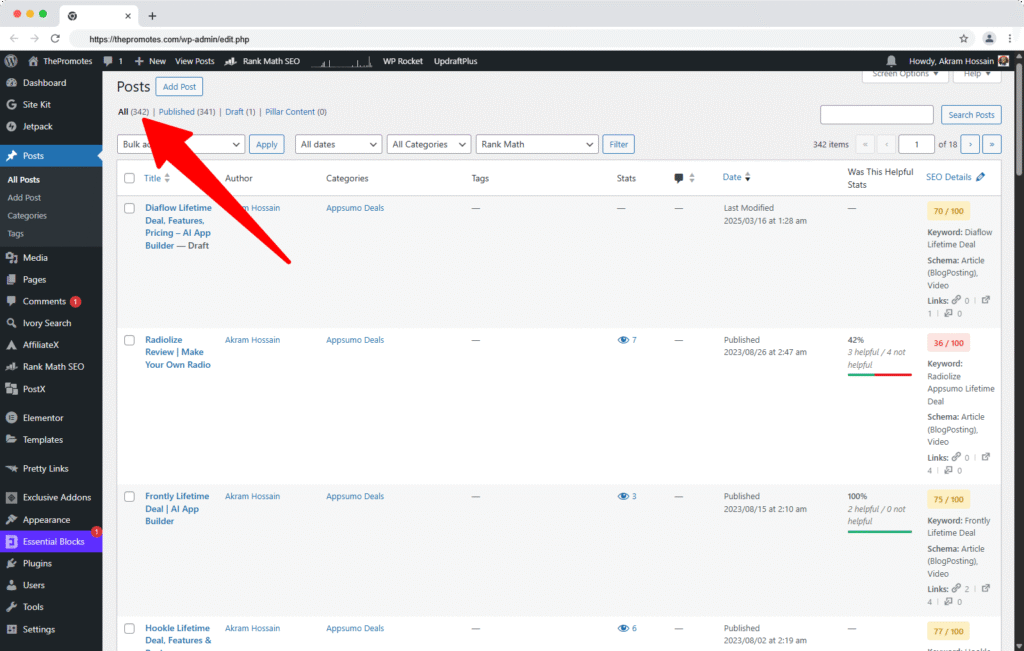
Every time I wrote a new AppSumo or lifetime deal review, Rank Math’s content score kept me in check. I published almost 330+ Appsumo deal content on ThePromotes, and all posts are optimized by Rank Math SEO plugin.
Instead of guessing whether a post was “SEO-friendly,” I had a clear, actionable score that showed me what I was missing, whether it was keyword placement, headings, or readability.
That small nudge to hit a higher score made a noticeable difference in how my posts performed.
Balancing Keywords with Conversions
Affiliate blogging is tricky: you want to rank for the right keywords, but you also need to convince readers to click through and buy. Rank Math helped me find that balance.
By focusing on long-tail deal keywords (like [Product Name] lifetime deal review) and naturally weaving them into my content, I was able to attract qualified traffic without making my posts sound robotic.
Real-Time Feedback on Titles, Descriptions, and URLs
I used to overthink titles and meta descriptions, until Rank Math simplified the process. With real-time feedback, I could instantly tweak titles to include the focus keyword while still making them catchy for readers.
The same applied to meta descriptions and URL slugs, ensuring every review had the best chance of standing out in Google results.
Internal Linking Suggestions to Build Authority
One feature I underestimated at first was Rank Math’s internal linking suggestions. As I built up more reviews and deal articles, it became super easy to link them together.
Not only did this help with SEO by passing authority between posts, but it also kept readers browsing multiple deals on ThePromotes, which meant more clicks and more potential affiliate earnings.
Looking back, these on-page optimizations might seem like small steps, but they added up fast.
Rank Math made sure I wasn’t just publishing content, I was publishing content that could compete and convert.
Technical SEO – Keeping ThePromotes Search-Friendly
While on-page optimization got my content in shape, I quickly realized that the technical side of SEO could make or break ThePromotes.
The last thing I wanted was well-written reviews sitting unnoticed because search engines couldn’t properly crawl or understand my site.
This is where Rank Math quietly did a lot of the heavy lifting.
Optimized XML Sitemap
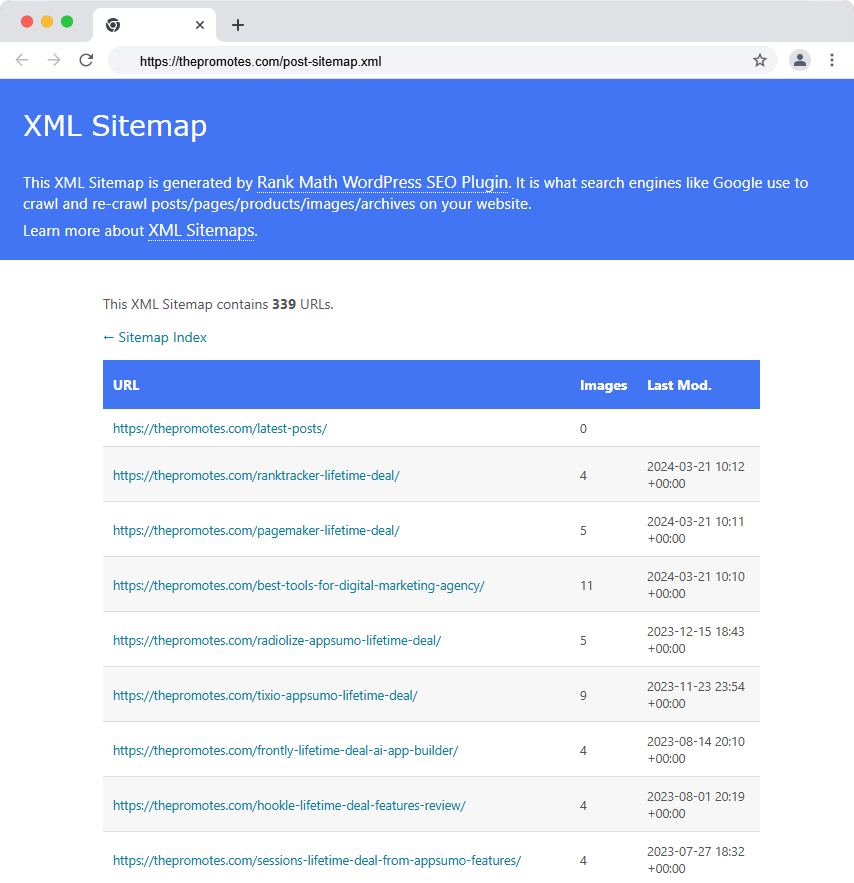
Rank Math automatically generated a clean XML sitemap, which made it easy for Google to discover my latest posts and product reviews.
I didn’t have to manually update anything; every time I published a new deal blog post, it was instantly added to the sitemap.
robots.txt & .htaccess Management
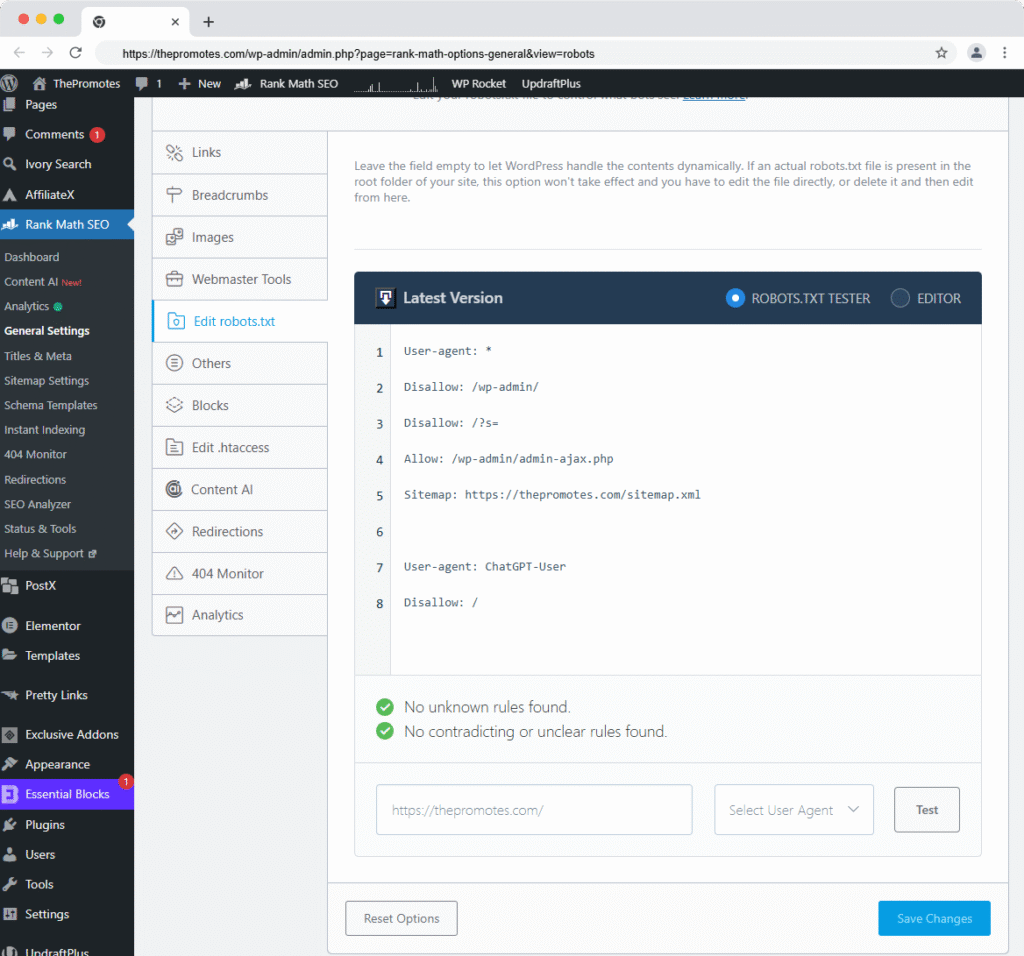
Normally, tweaking files like robots.txt or .htaccess can be intimidating, especially for new bloggers. Rank Math simplified this process with an easy-to-use interface right inside WordPress.
This gave me more control over what search engines should (and shouldn’t) crawl without the fear of breaking my site.
Fixing Indexation Issues
In the early days, I ran into some indexation challenges; certain categories and tags weren’t showing up in search the way I wanted.
Rank Math helped me diagnose and fix those issues quickly by giving me direct visibility into what was blocked or missing.
As a result, more of my content started appearing in search results.
Structured Data for Rich Results
One of the biggest wins for ThePromotes was structured data. By using Rank Math’s built-in schema support, I was able to apply the Product schema to my deal reviews.
This meant my posts could appear in Google with rich results, complete with product names, star ratings, and other details that made my listings stand out.
Technical SEO might not be the most glamorous part of blogging, but it’s absolutely essential.
Thanks to Rank Math, I didn’t need to hire a developer or buy multiple tools; the plugin kept ThePromotes clean, crawlable, and competitive right from the backend.
Tracking Growth – The Data That Kept Me Going
One of the toughest parts of blogging is staying motivated when results don’t show up overnight.
In the beginning, I’d spend hours writing reviews and deal articles, but I had no idea which posts were actually moving the needle.
That changed once I started using Rank Math Analytics.
Tracking Top Pages and Keywords
With Rank Math connected to Google Search Console, I could see exactly which pages and keywords were bringing in traffic.
Instead of guessing what worked, I had a clear view of my best-performing reviews and how people were finding ThePromotes on Google.
Spotting the Winning Deals
Not every AppSumo or LTD review gets the same attention. Some products took off, while others barely got clicks.
Rank Math helped me identify which deal reviews were driving the most traffic, and more importantly, which ones were converting into affiliate sales.
This gave me a blueprint for what kind of content to double down on.
Pivoting Based on Rankings
The keyword ranking insights were a game-changer. If a review was sitting on page two or three, I knew it just needed a little more optimization, maybe stronger internal links, a sharper meta description, or an update with fresh details.
On the flip side, when I saw a post climbing fast, I made sure to support it with related content to capture even more search traffic.
Instead of blindly publishing and hoping, Rank Math showed me the data I needed to make smarter content decisions.
Over time, that’s what helped me turn ThePromotes from just another blog into a site that actually earned real, consistent income.
The Results – ThePromotes Earned $14.5K in 1.5 Years
Looking back, the growth of ThePromotes feels like the perfect mix of patience, consistency, and the right tools.
It definitely wasn’t an overnight success, but the steady progress kept me motivated.
The First 4 Months
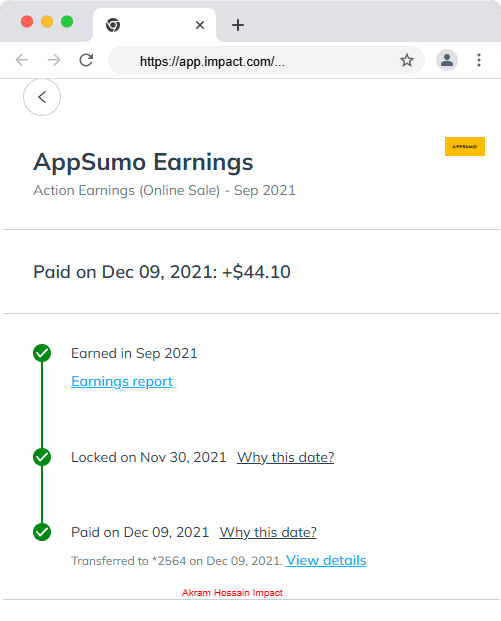
For the first few months, I was publishing reviews and optimizing every post with Rank Math, but traffic was slow.
Around the 4-month mark, I earned my very first $44.10 USD affiliate commission. It wasn’t much, but it was proof that the strategy was working. I was overwhelmed by a flood of joy.
The 1-Year Mark
By the end of the first year, traffic started to stabilize, and affiliate income became consistent.
Some AppSumo deal reviews were ranking on the first page, and I was seeing three to four-figure monthly earnings. At this point, I knew ThePromotes had real potential.
I earned almost $5K USD within a year.
1.5 Years Later
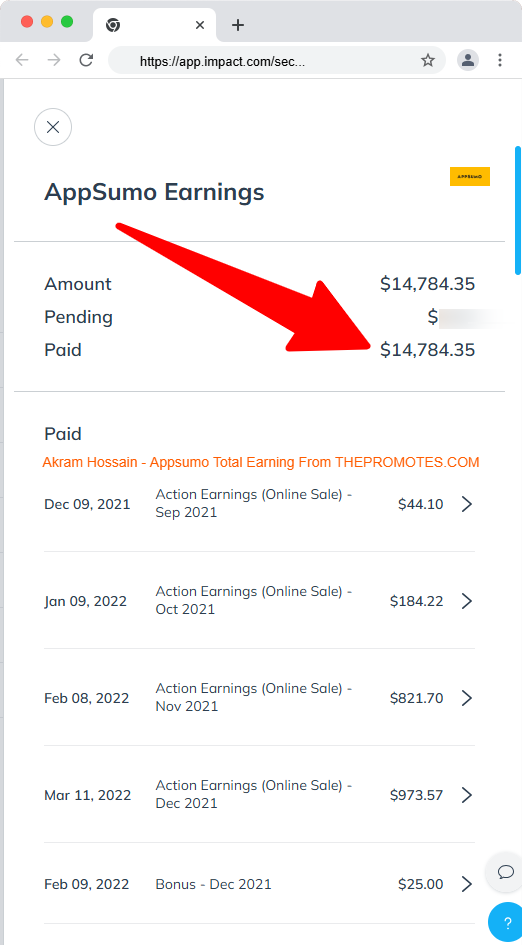
After 18 months, the site had generated $14,500+ in total affiliate earnings. The reviews that consistently ranked for keywords like “[Product Name] lifetime deal review” and “AppSumo LTD” were the main drivers behind this growth. What started as an experiment turned into a reliable income stream.
You can watch a simple clip of video clip about my Appsumo earnings: https://www.loom.com/share/14b406c6a5494a1fbd67ff7618ed139f
The best part? I achieved this without hiring a content team, spending big on ads, or overcomplicating the process.
By sticking to SEO fundamentals and letting Rank Math guide me with optimization, schema, and analytics, I built a blog that not only ranked but also paid off.
Lessons I Learned from Using Rank Math on ThePromotes
Running ThePromotes taught me a lot about blogging, SEO, and affiliate marketing, but if I had to boil it down, a few lessons stand out clearly.
The BOLD statement is, I became an SEO professional from ThePromotes.
SEO is a Long Game
It took months before I saw my first commission and over a year before the site became truly profitable.
Without SEO (and Rank Math keeping me on track), I probably would’ve given up too early.
On-Page Details Add Up
The content score, title/meta feedback, and internal linking suggestions might seem small on their own, but together they made my reviews competitive.
Rank Math forced me to pay attention to the little details that compound over time.
Schema and Structured Data Matter
Product schema made my reviews stand out in search results. Having star ratings and product details visible directly in Google SERPs gave ThePromotes an edge against blogs that weren’t using rich snippets.
Data > Guesswork
Instead of blindly chasing random keywords, Rank Math Analytics showed me exactly which reviews and keywords were working. That insight helped me pivot my strategy and focus on the content that actually drove traffic and revenue.
The Right Tools Save Time (and Headaches)
As a solo blogger, I didn’t have the bandwidth to juggle multiple SEO tools or constantly tweak technical files. Rank Math gave me everything I needed in one place, which let me spend more time writing and less time troubleshooting.
If anything, this journey confirmed that good SEO doesn’t have to be complicated. With the right process and the right tool, even a first-time blogger can build something profitable.
Why I Still Stick with Rank Math
Even after years of running ThePromotes, Rank Math is still the SEO plugin I rely on every single day. What started as a helpful setup wizard back in 2021 has turned into a tool I can’t imagine running the site without.
The free version gave me everything I needed to launch and grow, and as the site scaled, upgrading to Rank Math Pro only made things better, especially with advanced analytics and schema options tailored for affiliate content.
It’s not just about rankings; it’s about having confidence that my content is optimized, my site is search-friendly, and my strategy is backed by real data.
Looking back at the $14.5K journey, I know one thing for sure: ThePromotes wouldn’t have grown the way it did without Rank Math guiding the SEO side of things.
And that’s exactly why I still stick with it today, because it continues to grow with me, not against me.
If you’re starting a blog, especially in a competitive niche like affiliate marketing, don’t underestimate the role of your SEO foundation. For me, Rank Math wasn’t just a plugin — it was a partner in the process.

